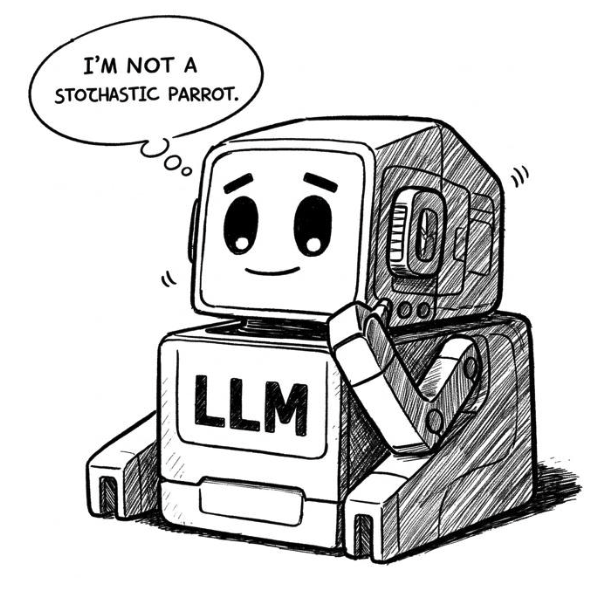Can LLMs Think About Thinking? Exploring Metacognition in AI

Deep Dive Series: Can LLMs Think About Thinking, and Can We Leverage Such Traits?
This article explores the burgeoning field of metacognition in Large Language Models (LLMs), drawing parallels to human cognitive abilities and detailing cutting-edge research from Princeton Language and Intelligence (PLI) and its collaborators.
Understanding Metacognition
Coined by John H. Flavell in 1979, metacognition refers to "knowledge and cognition about one's own cognitive phenomena." Early studies showed that children develop metacognitive abilities, which educators later leveraged to improve learning and decision-making. The article posits whether LLMs, with their advanced natural language processing capabilities, also exhibit such traits.
Establishing LLM Cognition: Beyond "Stochastic Parrots"
Before exploring metacognition, researchers needed to confirm that LLMs possess genuine cognition, not just mimicry. This involved demonstrating that LLMs can make sense of language. Two key papers published in 2023 on arXiv addressed this:
- "A Theory for Emergence of Complex Skills in Language Models" (Arora et al.): This work linked neural scaling laws to skill acquisition. It proposed that as LLMs scale, their ability to combine multiple skills for language tasks improves exponentially. For instance, a model's capacity to combine k-tuples of skills increases with parameter scaling.
- "Skill-Mix: A Flexible and Expandable Family of Evaluations for AI models" (Yu et al.): This paper introduced an evaluation framework to test the theory. SKILL-MIX prompts LLMs to generate text demonstrating specific combinations of language skills on given topics. Auto-grading and human checks confirmed that models like GPT-4, with sufficient scale, move beyond the "stochastic parrot" label, exhibiting true cognition.

Metacognition in LLMs: Mathematical Problem Solving
Researchers investigated LLM metacognition by asking them to identify the concepts needed for mathematical problem-solving. In a study involving the GSM8K dataset (grade school math problems), LLMs were prompted to:
- Identify fine-grained skills required for each problem.
- Group these skills into broader, compound skills (e.g., "basic arithmetic operations").
- Associate problems with these compound skills.
This process created a repository of "skill exemplars" – question/answer pairs linked to compound skills – capturing the LLM's knowledge about its own knowledge. This metacognitive information was then used to improve LLM performance by providing in-context examples tailored to the identified skills.

INSTRUCT-SKILLMIX: Efficiently Training Smaller LLMs
Building on these findings, the PLI team developed INSTRUCT-SKILLMIX, a method to fine-tune smaller LLMs using synthetic data generated from a larger LLM's metacognition. This process involves:
- Skill Extraction: A frontier LLM (like GPT-4 Turbo) identifies relevant topics, necessary skills for those topics, and associated tasks (e.g., "information seeking").
- Data Generation: The frontier LLM generates instruction-response pairs based on random combinations of skills and tasks. This creates a diverse dataset of approximately 4,000 pairs.
Fine-tuning a smaller model like LLaMA-3 8B on this INSTRUCT-SKILLMIX dataset resulted in significant performance gains, outperforming larger models on benchmarks like AlpacaEval2.0. This demonstrates a cost-effective way to imbue smaller LLMs with advanced capabilities.

Implications and Future Directions
Understanding LLMs through the lens of metacognition offers insights into their complex inner workings. Research suggests LLMs might "ruminate" on outputs for self-consistency, and metacognition can be steered towards AI safety and alignment with human values. These advancements suggest a promising future for leveraging LLM metacognition to create more capable, understandable, and aligned AI systems.
Key Takeaways:
- LLMs are demonstrating cognitive abilities, moving beyond simple pattern matching.
- Metacognition, or "thinking about thinking," is an emerging trait in advanced LLMs.
- Research frameworks like SKILL-MIX and methods like INSTRUCT-SKILLMIX are crucial for evaluating and enhancing LLM capabilities.
- Leveraging LLM metacognition offers pathways for improving AI performance, efficiency, and safety.
This exploration highlights the rapid evolution of AI and its potential to mirror and augment human cognitive processes.
Original article available at: https://blog.ai.princeton.edu/2025/04/29/deep-dive-series-can-llms-think-about-thinking-and-can-we-leverage-such-traits/